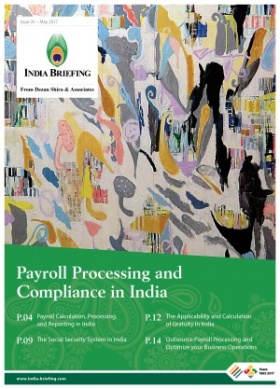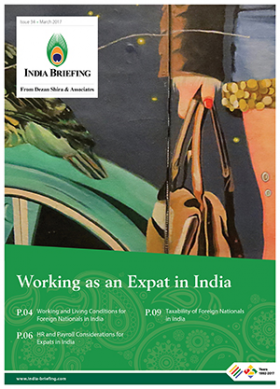Setting Up a Wholly Foreign-Owned Subsidiary Company in India
Under Indian law, foreign investors are able to establish wholly owned subsidiary companies (WOS) in the form of private limited companies if they operate in sectors that permit 100 percent foreign direct investment (FDI).
With India’s recent loosening of FDI caps, companies are now also able to establish WOS in the telecom services and asset reconstruction sectors. Establishing a private limited company can be a lengthy and complicated process involving multiple steps.
First, a minimum of two directors must be appointed and registered through India’s e-filing system for Director Identification Numbers (DIN). Other minimum requirements for the establishment of a private limited company include the existence of two shareholders (who may be the same person as the directors) and a minimum share capital of INR 100,000 (1 Lakh).
Second, a suitable name must be selected that indicates the main objectives of the company, and submitted with the RoC along with a brief description of the business’s proposed functions to verify both the name’s appropriateness and availability.
Upon successful name registration, the applicant company has 60 days to file its Memorandum of Association (MOA) and Articles of Association (AOA), and proceed with formal incorporation filings.
Both the MOA and AOA must be stamped with the appropriate duty after the needed RoC fees and stamp duty have been paid, and both forms signed by at least two subscribers with a witness.
Third, the directors must acquire Digital Signatures Certificates (DSC).
Within this 10-day time window, the following documents must also be filed with the Ministry of Corporate Affairs web portal along with the requisite filing fees:
- Form 1 – Application for incorporation along with the MOA and AOA
- Form 18 – Notice of situation for the registered office (proof of address, etc.)
- Form 32 – Details of the company’s board of directors
Upon successful submission of the above documents, the RoC will issue a Certificate of Incorporation and a Corporate Identification Number (Corporate Identity).
The process generally takes seven to eight weeks to complete, and private limited companies are permitted to commence business immediately following their successful incorporation.
It must also be known a more simplified form for company incorporation has been in place since October 1, 2016, when the MCA introduced “SPICe” or ‘Simplified Proforma for Incorporating Company Electronically’ via e-forms INC-32, INC-33 (Memorandum of Association), and INC-34 (Articles of Association).
Applicable taxes
While India has been liberalizing its governing policies since 1991, the country’s tax structure remains among the most complex and difficult to navigate in the world.
Understanding the wide variety of laws, regulations and procedures can be confusing for even the savviest of business operators.
Foreign companies that do not seek specialized advice often end up overpaying on taxes or on the associated penalties and interest that go along with them.
What follows is a brief description of the various taxes which should be taken into consideration when incorporating a private limited WOS company in India.
Corporate income tax in India
A company, whether Indian or foreign, is liable to pay corporate income tax (CIT) under the country’s Income Tax Act, 1961. While a resident company is taxed on its worldwide income, a non-resident (foreign) company is taxed only on income that is received in India, or that arises, or is deemed to accrue in India.
The rates are explained in the table below.
 Surcharge
Surcharge
The surcharge on domestic companies effectively increases the total tax paid by private limited companies.
We list the surcharge applicable for domestic private companies below.
 Health and education cess
Health and education cess
This amounts to four percent of the CIT and surcharge for the financial year 2018-19 and assessment year 2019-20.
Minimum Alternate Tax
Companies having low or even no profits are subjected to a Minimum Alternate Tax (MAT) of 18.5 percent + surcharge + health and education cess.
Tax on the distribution of dividends
Corporate entities are subject to a tax on the distribution of dividends. However, in the case of shareholder dividends, the associated income is exempt from tax. The current effective rate of the Dividend Distribution Tax is 16.995 percent (15 percent plus a 10 percent surcharge and an education cess of 3 percent). No exemption from payment of the DDT is granted for the profits relating to SEZ developers.
To avoid a situation of double taxation being created by the DDT, it is permitted that, for the purpose of computing the tax, any dividend received by a domestic company during any financial year from its subsidiary shall be allowed to be deducted from the dividend to be distributed. This is provided the dividend received by the domestic company has been subject to DDT and the domestic company is not the subsidiary of any other company.
Taxation of royalties/technical fees
Under domestic tax law, the royalties/technical fees that are payable to non-residents with a permanent establishment in India are taxed on a different basis compared to non-residents without permanent establishment in India. Concessional tax rates apply if the agreement relates to a matter that has been approved by the government of India. The payments made are subject to tax avoidance agreements entered into by the non-resident’s country.
Wealth tax
Wealth tax is calculated on March 31st of every year (referred to as the valuation date). Wealth tax is charged to both individuals and companies at the rate of one percent of the amount by which the “net wealth” exceeds US$45,675 (Rs 3 million).
The term “net wealth” is basically defined as the excess value of certain assets over accumulated debt. Assets include guest and residential houses, motorcars, jewelry/ bullion/utensils of gold and silver, yachts, boats, aircraft, urban land and cash in hand. A debt is an obligation to pay a defined sum of money arising from the assets included in “net wealth.”
About Us
India Briefing is published by Asia Briefing, a subsidiary of Dezan Shira & Associates. We produce material for foreign investors throughout Eurasia, including ASEAN, China, Indonesia, Russia, the Silk Road, & Vietnam. For editorial matters please contact us here and for a complimentary subscription to our products, please click here.
Dezan Shira & Associates provide business intelligence, due diligence, legal, tax and advisory services throughout India and the Asian region. We maintain offices in Delhi and Mumbai and throughout China, South-East Asia, India, and Russia. For assistance with India investment issues or into Asia overall, please contact us at india@dezshira.com or visit us at www.dezshira.com.
- Previous Article Using India’s Double Tax Agreements
- Next Article India Regulatory Brief: New ‘Black Money’ Standards, Changes to Corporate Income Tax











